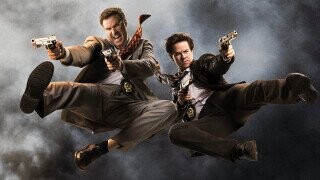Will Ferrell's 'The Other Guys' -- An Anti-Capitalist Masterpiece

Welcome to ComedyNerd, Cracked's daily comedy superstore. For more ComedyNerd content, and the secret of the Mummy's curse, please sign up for the ComedyNerd newsletter below.
Don't Miss
If you haven't seen The Other Guys since it came out in 2010, you probably remember it as that wacky movie where unlikely action hero Will Ferrell and unlikely any-type-of hero Mark Wahlberg try to become the new badass cop couple after Dwayne "The Rock" Johnson and Samuel L. "The Samuel L. Jackson" Jackson fatally miscalculate the proximity of some bushes.
But if you've rewatched it recently, you know that, much like the messy coffee table in the scene with Wahlberg accosting his ex-girlfriend in an art gallery, this movie is a complex critique of life under capitalism. This isn't a fan theory like "Space Jam is about the Lebanese Civil War" or something -- this was the stated intention of co-writer/director Adam McKay.
Other than being a name on the credits of Succession, McKay is most famous today for making movies about tragic topics like the media's dangerous mishandling of the climate crisis (Don't Look Up), the unchecked financial irresponsibility that led to the Great Recession (The Big Short), and Dick Cheney's mere existence (Vice). But, back in 2010, McKay was best known for directing comedies about Will Ferrell shouting at actors desperately trying not to break character (Anchorman, Talladega Nights, Step Brothers). Despite featuring plenty of shouting, The Other Guys represents a transition point between those two types of films.
The Other Guys was written while the financial collapse was "actively happening," which made McKay realize that you can't make a cop movie where the bad guys are drug smugglers anymore because the threat posed by those types of villains almost seems quaint by now. As McKay told Mental Floss: "How do you do a modern cop buddy film when banks have disappeared trillions of dollars and millions of people have lost their homes through this kind of bureaucratic malfeasance?" So, he turned Ferrell's character into a forensic accountant who stumbles upon a multi-billionaire's cartoonishly greedy but 100% realistic plot to screw over a ton of regular people, including rank-and-file cops. It's probably not coincidental that Michael Keaton's police captain character had to get a second job at Bed, Bath & Beyond to pay for his son's education.
Intentionally or not, a running theme in this movie is that capitalism dehumanizes and demeans us, like when Ferrell's character slowly turns himself into a grotesque pimp to pay for his college's jacked-up tuition and doesn't even realize it.
Or when Ferrell and Wahlberg keep falling for Steve Coogan's absurd bribes because, damn, who doesn't want some free courtside tickets and fancy cucumber water? Don't you dare to pretend you wouldn't abandon your morals and dignity to see Jersey Boys.
Incidentally, the filthy rich corporate villains played by Coogan and Anne Heche could have easily been characters in The Big Short -- especially because of the part where they cause a financial crash and end up being bailed out by the government. The fact that a movie with such relevant themes has such low resolution, 2007-looking-ass clips on YouTube almost seems like a temporal anomaly.
And then there's the movie's credits, which were actually not McKay's idea: the designers are the ones who suggested turning the end of the film into an infographic about the financial crisis that ensured everyone was too angry to care about the best boy grip.
Even though McKay didn't direct this part, you can still see it as a sort of a blueprint for The Big Short's infotainment sections (just replace friendly graphics with bathing celebrities).
The Other Guys is the sweet spot between McKay's mindless comedies and his movies about The Issues. And, in a way, it was a more effective vehicle for social commentary than something like Don't Look Up because it didn't take itself too seriously and thus avoided the smug tone the latter has been accused of. Plus, there's no mistaking the bad guys in this movie (corporate America), whereas Don't Look Up has already been interpreted as being a warning against everything from "oppressive vaccine mandates" to "communism."
Look, we're not saying McKay should have made a movie where Will Ferrell and Mark Wahlberg rough up some politicians and journalists and solve climate change, but ... wait, on second thought, yeah, that's exactly what we're saying. That'd be dope. Call us, Adam.
Follow Maxwell Yezpitelok's heroic effort to read and comment on every '90s Superman comic at Superman86to99.tumblr.com.
Top image: Sony Pictures
